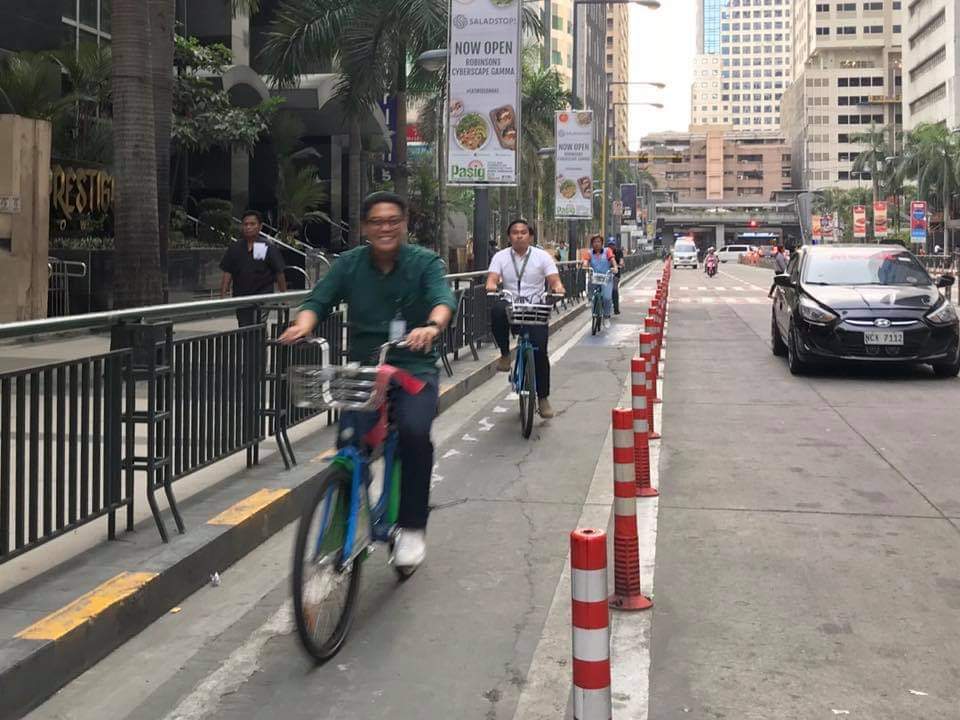The mountain city of Baguio in the Philippines is reallocating the equivalent of US$ 88,000 towards establishing bike lanes to encourage safe travel during the COVID-19 pandemic and to control air pollution.
It was announced last week as part of a larger package of US$ 369,000 (18.1 million Philippine pesos) approved by the City Council to fund projects improving road safety and traffic conditions considered “urgent and necessary”.
The funds were reallocated from a subsidy for drivers of Public Utility Jeepneys (one of the main forms of public transport in many Philippine cities) servicing certain routes when Baguio went into General Community Quarantine in May.
Baguio saw a surge in the popularity of cycling as an alternative way of getting around town in a time of physical distancing and quarantine — the reason the project was deemed urgent, according to Baguio City Mayor Benjamin Magalong — mirroring experiences in many cities in the world, many of which put into place temporary measures in response.
And, like some cities — such as Paris, Milan and Bogota, which saw the occurrence as a chance to introduce or speed up plans for infrastructural changes and policy nudges towards cleaner, more active forms of mobility — Baguio decided to make the change more permanent for health reasons.
According to the Manila Bulletin, Mayor Magalong said that the bike lanes and other road safety measures were “the city’s way of promoting health and wellness and environmental protection to help improve the city’s air quality and at the same time introduce an alternative mode of transportation”.
Other priority projects to be funded by the earmarked funds include the improvement of road markers, the construction of a bridge connecting two busy streets, the installation of international standard road signs and symbols, and the installation of an electrical system at the city’s temporary waste transfer station along a major highway.
Baguio, a resort city dubbed the Summer Capital of the Philippines for its cool, mountain climate, is concerned about its declining air quality, partly caused by the increased transportation demands of its growing population.
Its new upcoming bike lanes are the latest progression in Baguio’s efforts to encourage cycling among residents.
In February 2018, the City Council approved a proposed ordinance requiring the installation of mandatory pedestrian, brisk walking and bicycle lanes in all feasible roads in the city, “by painting or with any other more efficient and practical means to inform and signify such lane to signal motorists and drivers to slow down and take extra caution for pedestrians, brisk walkers, joggers and cyclists.”
The ordinance aspired to the best practices of cities like Copenhagen, Norway and Amsterdam, emphasizing that these “purposely attempt to eradicate, and at least, mitigate air pollution from motorized vehicles that significantly contribute to global warming”.
In June, two Baguio councilors proposed an ordinance that would make every Sunday bicycle day and pushed for the creation of a bike lane around the city, while in July, one of the two councilors advocated for a law making it mandatory for cyclists and scooter riders in the city to use helmets and safety reflectors — both passed on their first readings.
Baguio is just one of many city governments in the Philippines racing to respond to the surge in demand for reliable, safe transport options in a time of social distancing and pandemic lockdowns.
On World Bicycle Day in June, the city of San Juan launched a 4.21-kilometre bike lane that passed by major landmarks, including City Hall, a public hospital and a major shopping centre, the first phase of a larger plan; a few days later, the Mayor of Iloilo, already famous for its achievements in advancing cycling culture, announced a proposed addition of a 32.86 kilometre bike lane.
In May, the Pasig City government started creating bike lanes and extending pavements in some areas of the city.
Marikina City, often hailed as a pioneer in planning and implementing bike-friendly infrastructure, was already ahead of the game, providing ready-made lessons for those looking to get their bike networks up quickly.
They are poised to receive support at the national level: under the proposed Safe Pathways Act, currently before Congress, national government departments would work with local government to establish a “people-oriented and pedestrian-friendly” network of pop-up bicycle lanes and emergency pathways connecting essential destinations, which can only be used by pedestrians, cyclists, and users of other non-motorized vehicles.
In the long run, the Act requires the Department of Transport and Department of Public Works and Highways “to prepare for the permanent adoption of established bike lanes, emergency pathways, and other pedestrian- and bike-friendly infrastructure”, according to Top Gear — reinforcing the country’s ongoing efforts in this area.
“As we adjust to the new normal, it is inconceivable to just go back to the way we were,” Senator Pia Cayetano, who authored the bill, told Top Gear.
“This health crisis forces us to rethink our way of life and explore changes that will improve our overall health and quality of life. Planning our cities and transport system require a Futures Thinking frame of mind,” she said.
Read the announcement from Baguio City: City realigns P18.1-Million to improve road safety
Banner photo by the Public Information Office, Government of the City of Baguio
